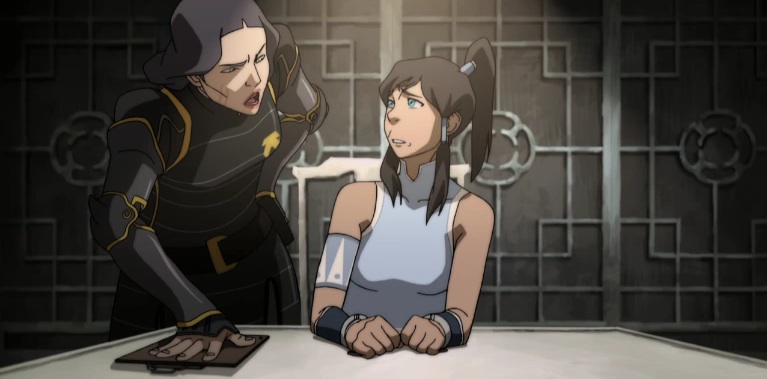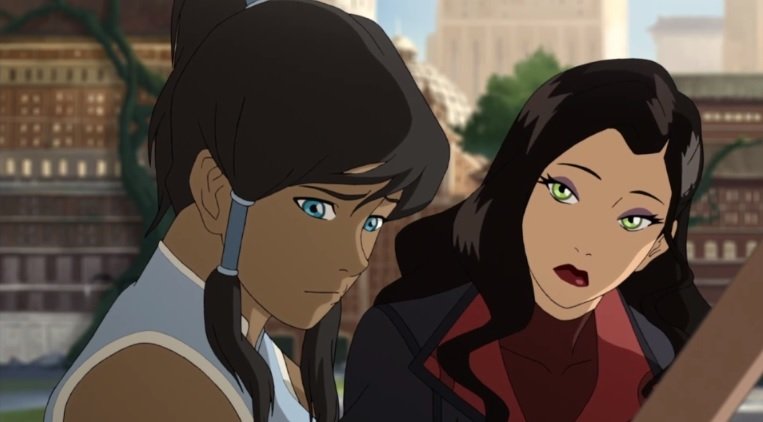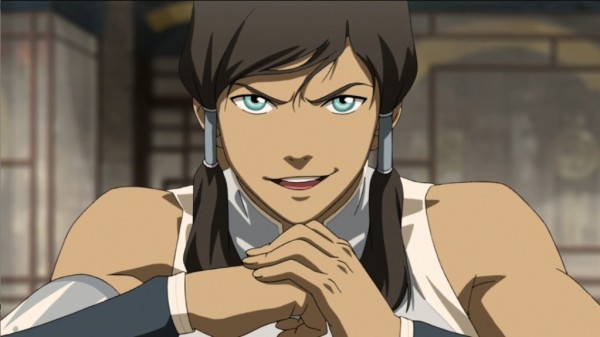It is possible that The Legend of Korra saved my sanity in March.
At the end of February, I finished writing a postgraduate thesis. As many former PhD candidates can attest, that’s the end of a process that can leave you worn out and broken, mentally—and sometimes physically, too. In my case, there were three weeks immediately afterwards where I couldn’t concentrate enough to read anything longer than a blog post. (And then a period of time where all I wanted to read were terrible queer romances.) But I needed something to keep my mind occupied.
Some spoilers ahead for the series.
That something turned out to be Legend of Korra, a show of which I’d heard very little until the internet exploded with joy for the fourth (and final) season’s closing scene. I never made it all the way through Avatar: The Last Airbender — I bailed sometime around the middle of the second season, due to an increasing level of annoyance with all the characters. But Korra was first on the list of things people recommended when I asked for suggestions on what to watch—and wow. I can see why.
Let’s start with the first thing that caught my attention—and kept it, over four seasons—Korra herself. A teenaged female protagonist with muscle definition who is allowed to be arrogant, and rash, and boastful about her physical prowess; whose first, instinctive response to a problem is to try to hit the problem until it goes away. But one who isn’t cruel or thoughtless: quite the opposite.
Hitting the problem usually makes things worse. Learning when not to go with her first instinct, learning how to make realistic assessments of her strengths and her circumstances, and how and when to rely on her friends, seem to be among the major themes of the show’s four seasons.
The dialogue is excellent. The characters are great—even Bolin, who doesn’t, in the end, get the best arc of development. Of all the characters we see across the four seasons, he’s the most emotionally expressive. He gets weepy. He’s kind of shallow, and a little bit dim. But his heart’s in the right place.

Legend of Korra does some rather refreshing things with the portrayal of its female characters, too. There’s Korra, for one. Kuvira, the villain of season four, who is cast almost as Korra’s mirror image—good intentions, but turned to tyranny and oppression rather than protection and support. Then there’s Asami Sato, part of “Team Avatar,” who’s explicitly characterised as an extremely intelligent businesswoman and engineer.
Older women, too, are important as mentors and characters within Legend of Korra’s world. Katara, famous elderly waterbender and hero of a previous generation is one example; Lin Beifong, the cranky and difficult-to-approach Chief of Police of Republic City is another. We see others, especially in the third and fourth seasons, and one of the most startling things about this show is that fact that women in Legend of Korra are not required to be likeable.
Indeed, they often seem to have less need or desire to be liked than the male characters do. Lin Beifong and her estranged mother Toph exemplify this, but so too does Eska, Korra’s Water Tribe princess cousin. Korra herself has to deal with the fickleness of public opinion—the Avatar isn’t well-liked when she can’t fix everyone’s problems. But above all they are allowed to be abrasive and confident of their skills, to hold grudges and to not want to talk about their feelings. To hold and to use power on the same terms as everyone else.
They are also allowed to screw up on the same terms as everyone else. The narrative doesn’t punish them more for it. It doesn’t punish them less, either. But I didn’t realise, until well after I’d finished watching the series, that this was one of the largest reasons I came to love it as much as I ended up doing: it remains rare, almost exceptionally so, for narratives not to treat the consequences of their characters’ mistakes in explicitly gendered ways. Women’s mistakes and faults are very often treated differently than those of their male counterparts. Legend of Korra doesn’t do this. Which is rare enough that it comes as shocking relief.

Also, it doesn’t hurt that Korra and Asami not only like the same boy and have a relationship with him at different times, but remain friends, not rivals. And perhaps become even better friends for bonding over how awkward he is around them after the… complicated… break-ups.
Nor does it hurt that the final scene of the fourth season cements Korra and Asami’s relationship as canonically romantic. It’s nice to have some queer ladies represented.
Taken as a whole, The Legend of Korra isn’t perfect. (The second season in particular is uneven and weak.) But it is a deeply lovely thing, and I wholeheartedly recommend it to anyone else who needs to add more fun to their lives.
Liz Bourke is a cranky person who reads books and occasionally watches things. Her blog. Her Twitter.










